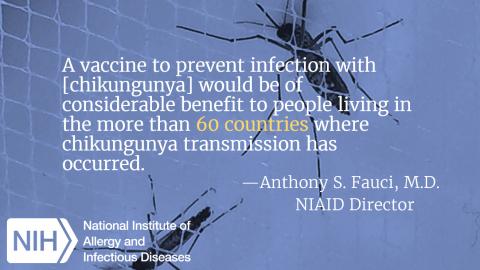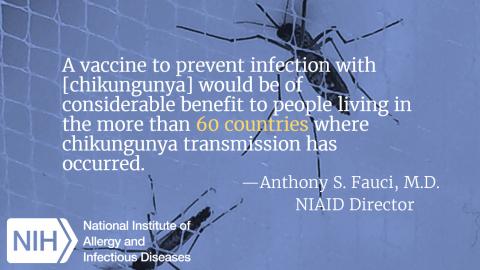
Credit: NIAID
A clinical trial of an experimental vaccine to prevent infection with chikungunya virus is now enrolling healthy adult volunteers at sites in the United States. The Phase 1/2 trial, which is sponsored by the National Institute of Allergy and Infectious Diseases (NIAID), part of the National Institutes of Health (NIH), is being conducted at several NIAID-funded Vaccine and Treatment Evaluation Units. The candidate vaccine, MV-CHIKV, was developed by Themis Bioscience of Vienna, Austria.
Although chikungunya is rarely fatal, the mosquito-transmitted virus causes an intense inflammatory reaction resulting in severe joint pain, fever, rash and muscle pain. While most symptoms usually resolve in days, the joint inflammation can linger.
"Chikungunya virus can cause debilitating joint pain that can last for months or even longer," said NIAID Director Anthony S. Fauci, M.D. "A vaccine to prevent infection with this virus would be of considerable benefit to people living in the more than 60 countries where chikungunya transmission has occurred, as well as travelers to those countries."
Chikungunya virus has been endemic in East Africa since at least the 1950s, when it was first discovered. There it circulates among monkeys and, occasionally, humans. The virus likely arrived in the Caribbean in late 2013, and as of March 2017, may have infected more than two million people in the Americas, according to the Pan American Health Organization (PAHO).
A 2014 Phase 1 trial of the MV-CHIKV vaccine conducted in Austria by Themis Bioscience showed that the experimental vaccine was safe and induced an immune response. The candidate vaccine is a measles vaccine virus modified to produce chikungunya virus proteins. Once inside a human cell, the vaccine induces the production of both measles and chikungunya proteins. The immune system then develops antibodies against those proteins, which may protect the vaccinated person from future infection by chikungunya virus.
Led by principal investigator Patricia Winokur, M.D., of the University of Iowa Carver College of Medicine, the new vaccine study will enroll 180 healthy adults ages 18 to 45 at three sites: the University of Iowa in Iowa City; Baylor College of Medicine in Houston; and Emory University in Atlanta. Participants will receive two injections of either low-dose or high-dose experimental vaccine or placebo. Neither the participants nor the investigators will know whether a volunteer is receiving placebo or investigational vaccine. The volunteers will be assigned at random into different groups that receive the two injections at different intervals (29, 85 or 169 days after the initial injection) in order to help the researchers determine which schedule is most effective.
Clinic staff will follow up with study participants by phone and during clinic visits over the course of 8 to 13 months to monitor for any adverse reactions or safety issues. The participants will provide blood samples to be analyzed for evidence of antibody production, which would indicate that the vaccine is prompting an immune response.
Themis Bioscience is currently conducting a Phase 2 trial in Europe with the same vaccine candidate. Other chikungunya vaccine candidates are also under investigation in different trials, including one that uses virus-like particles (VLPs) to induce an immune response in recipients. NIAID sponsored the Phase 1 trial of the VLP vaccine candidate; a Phase 2 trial began in 2015.
For more information about the MV-CHIKV vaccine study, see ClinicalTrials.gov using the identifier NCT03028441.
###
Media Contact
Elizabeth Deatrick
[email protected]
301-402-1663
@NIAIDNews
http://www.niaid.nih.gov
Original Source
https://www.niaid.nih.gov/news-events/niaid-sponsored-trial-experimental-chikungunya-vaccine-begins
############
Story Source: Materials provided by Scienmag





